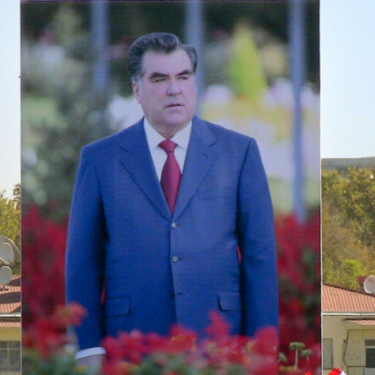Coronavirus crisis makes reporting even harder in Tajikistan

Reporters Without Borders (RSF) calls for more transparency and an end to harassment of journalists in Tajikistan, where the authorities insist there are no coronavirus cases and refuse to respond to journalists’ questions about the public health situation, accusing them of "sowing panic." Two journalists have been questioned at length by the police.
The lack of transparency since the start of March is encouraging disinformation but it was only to reiterate that there are no coronavirus cases that the health minister gave an interview to Pressa.tj on 7 April. Although bordering China, Tajikistan is one of the few countries to have reported no cases, along with North Korea and Turkmenistan.
The authorities are even refusing to answer journalists’ questions about the more than 300 people under an extended quarantine in a hospital specializing in infectious diseases, and why the police in Khujand, the country’s second largest city, have suddenly started wearing face masks. Access to the websites of most independent media outlets is blocked in Tajikistan.
Articles 6 and 24 of Tajikistan’s media law specify circumstances in which the authorities can refuse to answer journalists’ questions but a public health situation is not one of them. Radio Free Europe/Radio Liberty president Jamie Fly complained about Tajikistan’s refusal to cooperate with the media in a letter to the foreign minister last week.
In a statement on 6 April, the health ministry denied persistent rumours about a 60-year-old man who officially "died of pneumonia" but not Covid-19 in a hospital in the north of the country. The ministry urged the media "to trust only official information coming from public bodies" in order to avoid rumours "liable to sow panic in the population."
"Sowing panic" was the accusation that the police levelled against Sitora Safarova and Sherali Davlatov, two journalists working for the independent weekly SSSR, who were subjected to a lengthy interrogation after been detained on 5 March while photographing many residents trying to buy foodstuffs at a market in the capital, Dushanbe.
"It is the government’s lack of transparency about the situation that is encouraging the spread of rumours, not the media’s coverage of the epidemic," said Jeanne Cavelier, the head of RSF’s Eastern Europe and Central Asia desk. "We ask the relevant authorities to answer journalists’ questions about Covid-19, to stop harassing them, and to unblock independent news sites covering the epidemic, such as Asia-Plus and Akhbor."
Ranked 161st out of 180 countries in RSF’s 2019 World Press Freedom Index, Tajikistan has fallen no fewer than 45 places since 2015, above all because of its harassment of the few remaining independent journalists and the fact that it assumed a national Internet monopoly in 2018, resulting in massive online censorship.



